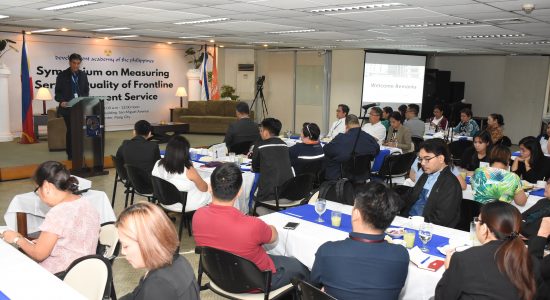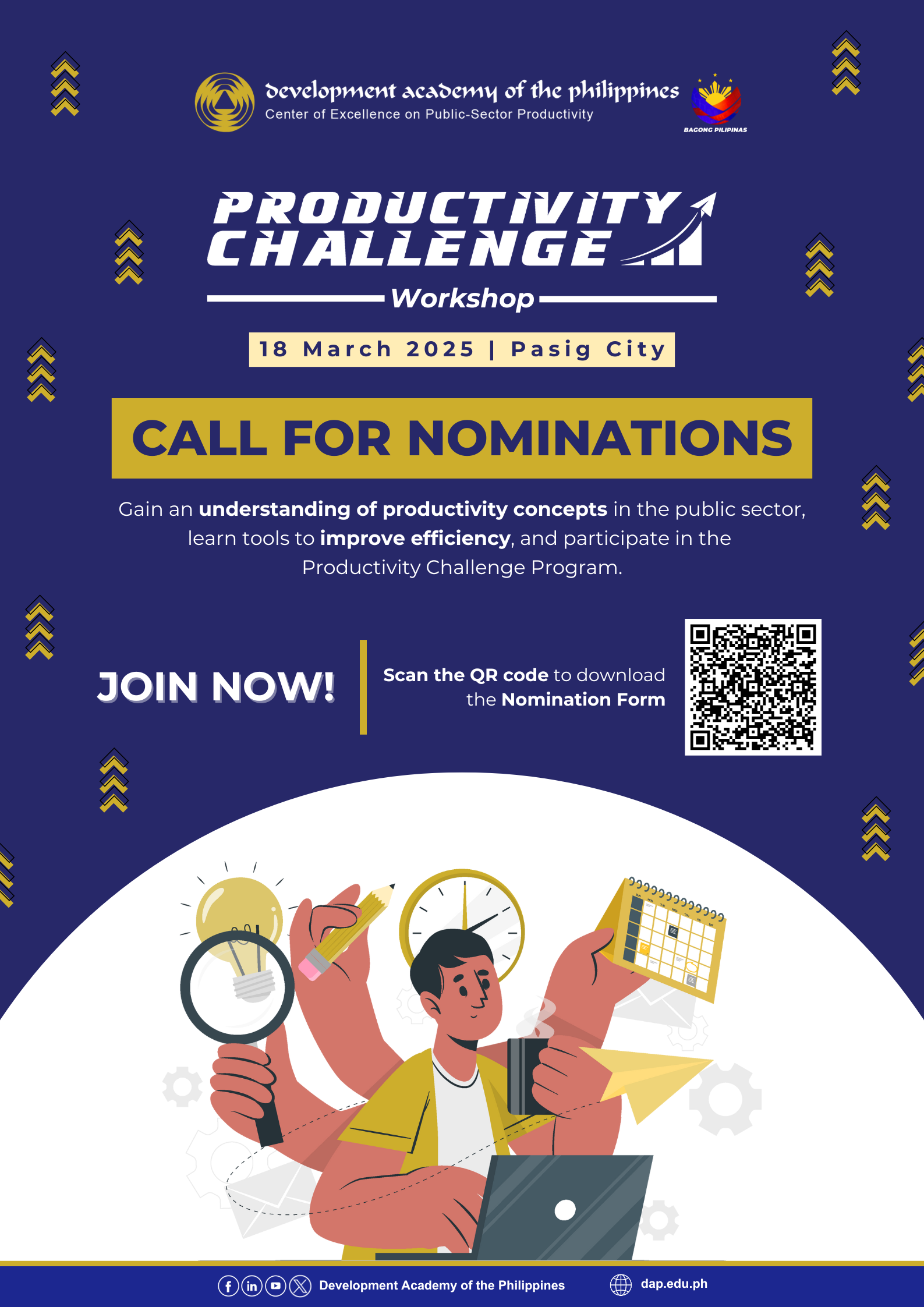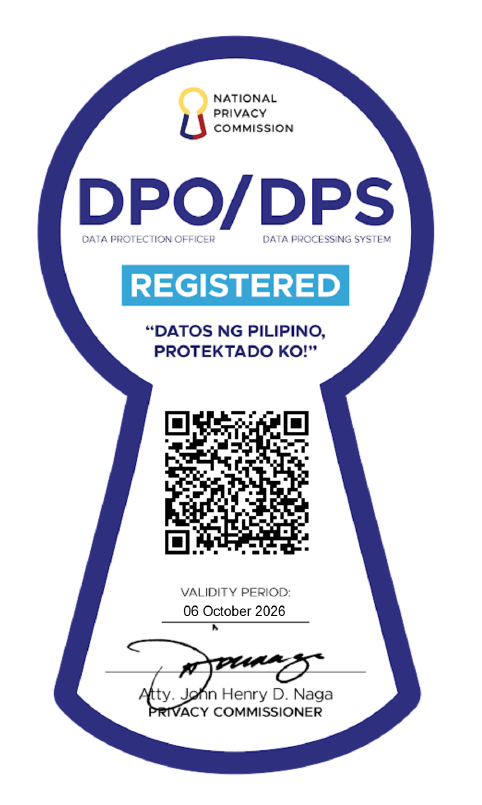
DAP President and Chief Executive Officer Engelbert Caronan, Jr. delivers his welcome remarks during the symposium on “Measuring Service Quality of Frontline Government Service” at the DAP Building in Pasig City. (Photo by Ped Garcia)
The Development Academy of the Philippines (DAP), as member of the Government Quality Management Committee (GQMC), organized a symposium on “Measuring Service Quality of Frontline Government Service” at the DAP Building in Pasig City last 10 July in its continuing commitment to promote and enhance the country’s productivity and service quality.
The symposium, a component of the five-year (2018-2022) initiative on “Institutionalizing Service Quality Standards” under the Government Quality Management Program (GQMP), is being implemented by the DAP’s Productivity and Development Center (PDC).
DAP President and CEO Atty. Engelbert Caronan, Jr. welcomed some 86 representatives from national government agencies (NGAs) covered in the 2018 Citizens’ Satisfaction Survey (CSS) conducted by the DAP Study Team, NGAs with frontline services dealing with the business sector, representatives from the leagues of cities and municipalities, and some oversight agencies. He underscored the three-tiered role of DAP: first, developing human capacity; second, developing organizations by assisting government offices; and third, as a policy research institution.
The GQMP project component, he said, is aligned with the DAP’s designation as Philippines’ focal organization and implementing institution for the Asian Productivity Organization’s Center of Excellence on Public Sector Productivity which aims to advance innovation and productivity in the public sector not just in the Philippines but also across Asia and the Pacific region.
DAP-PDC Vice President Arnel Abanto provided an overview of the project. He clarified that the standards to be developed are not mandatory and these will have to undergo a long process before getting institutionalized.
Meanwhile, Dr. Erniel Barrios, former dean of the University of the Philippines (UP) School of Statistics, presented the highlights of the 2018 CSS results on frontline government service which covered 3,146 citizens transacting with frontline services of selected NGAs in the NCR and Pampanga (Luzon), Cebu (Visayas), and Davao (Mindanao). The survey results revealed that the most satisfied respondents were from the NCR while the least were from Mindanao. The results showed a citizens satisfaction score of 86.93 which was based on the respondents’ level of satisfaction on four aspects of frontline service, namely, service delivery, access and facilities, communication, and payment process. In terms of service quality, wearing of uniforms and identification cards, being neat and professional were perceived with high importance. Simple and easy to understand processes as well as simple and easy to fill-out forms were rated as highly important as well. Dr. Barrios underscored the importance of having a feedback mechanism for both the citizens and service provider. The feedback should be used by the agency because of its implications on organizational development and, in fact, can be used as inputs to Performance Based Bonus. He also said that government agencies can learn a lot from the private sector in terms of having a feedback mechanism in place.
UP School of Labor and Industrial Relations Professor Dr. Virgel Binghay shared some strategies on measuring service quality standards and maintaining quality service. He emphasized that quality must be part of the organization’s culture, a way of life, i.e., continuous improvement should be internalized by public servants. “We are here for the humanity to serve… do not look at our customers/clients as mere numbers but as individuals with needs that we can address. They are our reason for being and we exist because of them,” he underscored.
Business Satisfaction Survey
DAP-PDC Director Monica Saliendres presented the 2019 project activities for institutionalizing service quality standards. She said a major activity of the project this year is the conduct of the Business Satisfaction Survey (BizSat) among government agencies with frontline services dealing with the business sector. Representatives of some government agencies present at the symposium have signified interest to participate in the survey. Survey results shall serve as baseline data for monitoring and improving business satisfaction on frontline government service to pinpoint areas for improvement and eventually contribute to making “doing business” in the Philippines easier.
Open Forum
During the open forum, some of the questions raised were about the conflict of innovation with government rules and requirements such as COA regulations and how seamless service in the government should be done. President Caronan, in response to the query on innovation, emphasized that innovative systems should be a culture and that bureaucracy should be innovative. He also said that the DAP continues to push for productivity in the government through its programs and projects.
Moreover, Dr. Binghay underscored the importance of having a “quality champion” in the agency, correlating the capacity of agency to generate data with its agenda and goals, using information with predictive value as input to decision-making in the agency, and educating both the customers and service providers through a feedback mechanism.
Likewise, the participants suggest to expand the scope of the initiative on institutionalizing service quality standards to include all government agencies with or without frontline services, conduct consultative dialogues with other sectors outside of the government, and conduct a study on how customers treat frontline agencies.
Closing Ceremony
DAP Senior Vice President Magdalena Mendoza, in her closing remarks, pointed out the importance of establishing trust and confidence of the transacting public and she said that this evident in the survey results. “They are paying us to submit the right document and not more than what is required… Interestingly, wearing ID and uniform, and professionalism are basic but if we can practice these, perception on government will rise,” she shared. “It is assuring that through these simple things we can convey that they are actually dealing with professionals and they are actually complying with simpler processes and predictable and consistently employed rules,” she added. She then encouraged the agencies to continue working towards a common goal in establishing a citizen-centered service delivery consciousness and culture of quality. – Ellinor Santos




